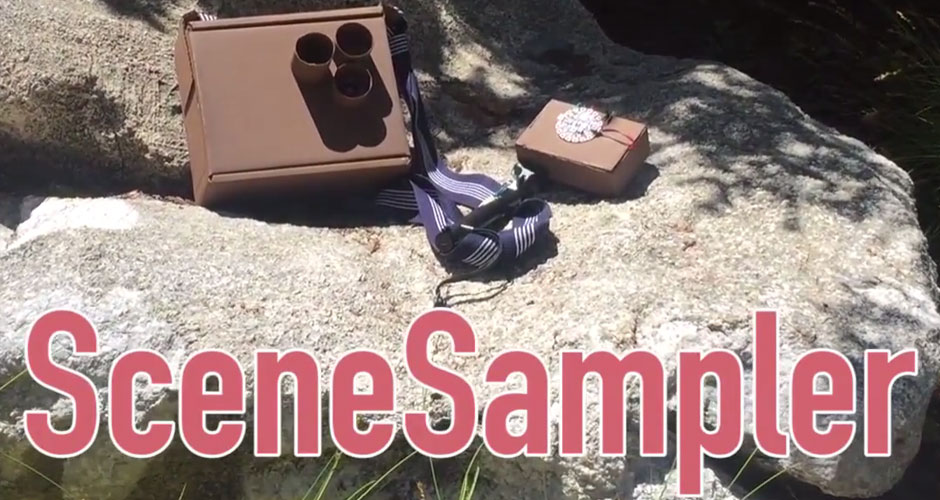
SceneSampler gives players a fun way to move together through the social space of a festival and capture interesting traces of what’s happening there in the form of recorded sounds and pictures.
Trailer: https://youtu.be/9JQqsMAGGi8
SceneSampler invites people to move through a festival in ways that they wouldn’t otherwise to capture traces of the social scene occurring there (in the form of pictures and sounds). The goal of SceneSampler is to give players and spectators a feel for the festival experience as it changes over time. It is a collaborative game for two players where each player gets a tech-enabled prop to aid them in completing game objectives. One wears a ‘camera’ with an embedded tablet to document scenes and the other carries a sound ‘sampler’ built using Adafruit components to identify specific types of social sounds. Players get collection challenges–e.g. find a silent crowd or a loud person–that require them to fill up the sampler with the ambient noise at the scene, then to take a snapshot of the scene itself. They then return to home base to share what they found with a human game master. Successful samples are marked on a map of the overall space with a sticker for that particular challenge, so over time, the map builds up a layer of stickers that mark popular festival locations. Captured images are also uploaded onto social media to compete for the most likes overall. Players can take on as many challenges as they like, and can pose for a group picture with a placard showing their accomplishments when done. SceneSampler gives players a fun reason to move together through a social space and captures interesting traces of what’s happening there.
Follow us on Facebook (https://www.facebook.com/SceneSampler-1920096484872722/?view_public_for=1920096484872722) and Twitter (@Scene_Sampler).
Designers – Social Emotional Technology Lab @ UC Santa Cruz (Eddie Melcer, James Fey, Elena Márquez Segura, Jared Pettitt, Katherine Isbister)
We are all part of the Social Emotional Technology (SET) lab at UC Santa Cruz, and really excited about using technology to make fun in-person games. Our research group has a history of making technology-enabled social games (see for example: http://www.katherineinterface.com/p26-isbister.pdf). The team includes: Katherine Isbister, a professor in the Computational Media department at UCSC; Elena Márquez Segura, a postdoc in the SET lab at UCSC; Edward Melcer, a PhD candidate at New York University; and Jared Pettitt and James Fey, undergraduates in the Computational Media program at UCSC. Please see the Social Emotional Technology lab webpage for more details: https://setlab.sites.ucsc.edu.
